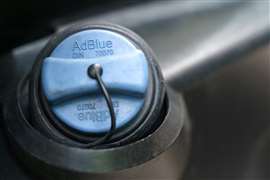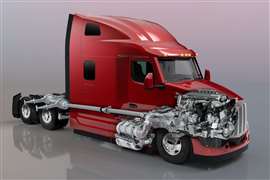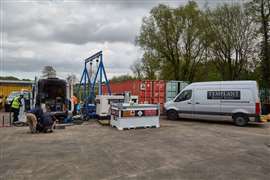Concerns over AdBlue grow in heavy transport, lifting sectors
08 October 2024
A European transport and crane association said the issue has been going on for months.
New research by European transport and crane association ESTA revealed concerns among those in the heavy transport and lifting sectors regarding engine faults that are thought to be caused by AdBlue diesel exhaust fluid (DEF). The research noted that a significant number of diesel engine breakdowns correlate to the use of AdBlue.
AdBlue DEF mitigates nitrogen oxides (NOx) emissions in a process called selective catalytic reduction (SCR). The fluid is a mixture of water and urea that is injected into diesel engine exhaust to react with NOx in the SCR system and break it down into nitrogen and water vapor.
A key concern from ESTA is that if the DEF system malfunctions, the vehicle engine may lose power and possibly even shut down. The consequences of this are potentially dangerous.
 The AdBlue DEF filler cap on a truck. (Photo: Dzmitry via Adobe Stock)
The AdBlue DEF filler cap on a truck. (Photo: Dzmitry via Adobe Stock)
Many Reported Issues
ESTA said crane rental companies have been informally reporting about the issue for months. Some of the reports attributed DEF to a third of all on-road breakdowns. Concerns were also raised at a meeting between ESTA members and representatives of the crane manufacturers via the European Materials Handling Federation (FEM).
As a result, ESTA said it has been encouraging its members to continue reporting problems with the use of DEF in mobile cranes and self-propelled modular transporters (SPMT).
The association is also attempting to identify the full nature and scale of the problem. At present, ESTA said it has heard from 55 companies across 10 countries, with most comments coming from France, Netherlands and the UK. They reported issues with wheeled mobile and crawler cranes, trucks and SPMTs. Most of the time, the issue in question was an on-road breakdown, with almost half being categorized as compromising safety. Many of the reporting companies said they had multiple incidents over the last two years. However, three companies reported over 20 incidents during that time.
“We will continue gathering information and will be consulting with the members of the joint ESTA and FEM European Regulations Workgroup that first raised the issue, and then decide on the next steps,” said Ton Klijn, ESTA director. “What is already clear, however, is that this is a serious issue with considerable safety implications — and it needs to be addressed as a matter of urgency.”
Temporary Override Solution
One solution ESTA identified is a temporary override programmed by engine manufacturers that would allow the engine to continue operating at full power for a limited time despite a DEF system malfunction. ESTA noted, however, that engine manufacturers might be reluctant to invest in diesel engine redesign, particularly given the commercial emphasis on developing electric power and power sources running on alternative fuels.
Global provider of specialty vehicle chemicals Wynn’s said on its website that AdBlue can crystalize at low temperatures. This can block its delivery system on the vehicle. the company said it has also seen crystals form in the AdBlue tank, lines and pump. Wynn’s said additives are available to reduce and prevent crystalization.
UK tank manufacturer Tuffa Tanks said in an April 2022 blog post that equipment operators can avoid AdBlue crystalization by buying the DEF from a reputable source and storing it properly before use, typically in a warm garage or storage facility.
AdBlue also typically freezes at temperatures below 14° F (-10° C), Tuffa said. In addition to it not being injectable, it could expand within the system and cause temporary or permanent damage.
Tuffa added that keeping a high level of AdBlue in the vehicle’s onboard storage tank will help insulate the solution and prevent freezing.
CONECTAR-SE COM A EQUIPE







